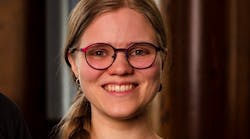The Byte Challenge is a digital, free and nonprofit platform for students and teachers. Its founder Carolin Neumann studied information technology at the Technical University of Berlin. Neumann is one of three finalists for the Young Engineering Award, which is intended to boost motivation for women to take up a career in science, technology, engineering and mathematics (STEM). The winner will be announced on April 21 during the WomenPower Career Congress at Hannover Messe (Figure 1).
The other two finalists are Lisa Ihde, a web designer, software engineer, design-thinking coach and author from the Hasso Plattner Institute in Potsdam, Germany, and Dr. rer. nat. Soraya Laghmari El Moussati, a lead engineer for environmental technology at Bayer in Leverkusen, Germany.
Neumann is an associate application consultant at IBM, where she develops internal cloud services, as well as tools for managing various project software. She is a role model at IBM events for female students.
Did you have any coach/mentor in your studies or your career who helped you to navigate the male-dominated domain and encouraged you to continue with a STEM career?
Carolin Neumann: Yes, I had several mentors throughout my studies and career who helped me navigate the male-dominated domain of STEM and encouraged me to continue my career in this field. In particular, I was fortunate to have a supportive family and several exceptional colleagues who provided guidance, encouragement and inspiration.
One community that is particularly influential in my early career is the female German Informatics Society (GI), which keeps pushing me to reach for higher goals. Being part of this community helped my entrepreneurial and management skills but also creates great rewards for my volunteering work. For example, I am invited to the Bürgerfest, the civic festival of the federal president. Additionally, Edna Kropp (tech lead at LivePerson), the current speaker of this community, also nominated me for this incredible award. She is a role model for me in balancing family life with a successful career in STEM.
In addition to my GI mentors, I also found support and inspiration from my previous employers, who give me great guidance in my time of need.
Overall, I believe that having a supportive network of mentors, role models and peers is essential for success in STEM fields. Through my experiences, I have learned that with the right support and encouragement, women can thrive in even the most male-dominated domains of STEM.
What are you doing to make yourself a role model or mentor to other girls/women who are interested in pursuing a STEM career?
Carolin Neumann: As a successful female entrepreneur in tech, I feel a strong responsibility to serve as a role model and mentor to other girls and women who are interested in pursuing a STEM career or even their own startups. Through my work with Byte Challenge, I have already impacted more than 1,000 students and inspired them with computer-science-related topics.
In addition, during my time as speaker of the Young German Informatics Society, I started the STEM Girls, a webinar series to help young female students with their mindset, orientation and confidence. Here I also reached more than 300 registrations, made a positive impact and inspired them to pursue their passions in tech.
Additionally, I am actively involved in mentoring programs and helping out as ambassador at the Digital Seeds student program to encourage entrepreneurship.
Ultimately, my goal is to help young women see that a tech career is not only possible but also highly rewarding. By serving as an educational-technology founder, role model and mentor, I hope to inspire more girls and women to pursue their dreams in STEM and positively impact the world.
With the skilled labor shortage that began pre-pandemic, was heightened by the shutdown and continues to linger, how can organizations capitalize on the availability of women to fill these skilled positions?
Carolin Neumann: There are several steps that organizations can take to capitalize on the availability of women to fill skilled positions. First and foremost, it is important to offer equal pay and provide good working conditions, including a healthy work-life balance. This can help to attract and retain female talent, who may be more likely to seek out organizations that value work-life balance and other supportive policies.
Additionally, it is important for organizations to actively promote diversity and inclusion, both in terms of their hiring practices and in the composition of their leadership teams.
In her relatively famous study, published in the Harvard Business Review, MIT’s Susan Silbey and her colleagues found that women in engineering were hoping to make a more socially conscious impact in their engineering pursuits than the males in the study. What, if anything, does this tell us about gender bias? And, if the report is indicative of a real female desire to make a difference, where might women find those types of jobs to have a positive impact on society and civilization with their engineering and automation expertise?
Carolin Neumann: The findings of the MIT study suggest that there may be underlying gender biases at play in the engineering field, particularly in terms of the types of impact that women and men hope to have through their work. However, it's important to recognize that not all women will necessarily have the same career goals or motivations. As Jordan B. Peterson has noted, "Not every man wants to be an engineer or a computer scientist, and not every woman wants to be a nurse or a teacher, but we should create conditions so that everyone who wants to can."
One way to create these conditions is to encourage interest in STEM fields early on through programs and initiatives like Byte Challenge, which exposes young children to computer science and other STEM subjects. This way, we can help to cultivate children's interest in these fields and provide them with the tools and knowledge they need to pursue successful careers in STEM.
What was your motivation for venturing into STEM studies in the first place?
Carolin Neumann: My motivation for venturing into STEM studies was a combination of my love for solving tricky problems and a desire to impact society positively. From a young age, I was fascinated by computer science competitions, which also led to the start of the Byte Challenge.
I was also motivated by a desire to challenge myself and my competition team to solve problems. Now I still enjoy challenging myself, and the tech field is excellent. The techno landscapes change so rapidly that one must constantly learn, which I find very appealing.
Overall, my motivation for venturing into STEM studies was a combination of personal interests, a desire to challenge myself, a strong sense of purpose and a desire to impact society positively.
Can you tell me a bit more about the Byte Challenge—where the idea came from, how it was started, what your goals are and the success you’ve had?
Carolin Neumann: Byte Challenge is a project of the nonprofit Gesellschaft für Informatik, founded on May 19, 2020, as an idea in lockdown by Stefan Hildebrand, PhD student Technical University of Berlin, and me. At first glance, one might think of a nerd competition. However, it is a year-round educational program that introduces students to unknown topics such as bitcoin, artificial intelligence (AI) or smart homes, or even the basics of computer science. The courses are available to all students worldwide. They can learn about topics they enjoy and are rewarded for doing so. No prior knowledge is required for participation.
The experience of achieving success together with friends was a lot of fun for both of us; in 2020, Byte Challenge was born from this motivation. Originally conceived as a computer-science competition, we quickly recognized the potential of bringing computer science into schools with the learning platform. With illustrative materials, we want to take away students' fear of difficult topics and encourage them to pursue STEM. In 2022, we reported 1,050 users and 62 schools, with the wish to inspire more women for STEM in the future.
Byte Challenge is working to be able to map the computer science curriculum and teach the subject in many different languages over the next five years. We want to make STEM cool and establish ourselves as a free, ad-free learning platform in schools. Digital education should be made available to all students free of charge. This year, a dashboard layout is to follow. Teachers will be able to view the progress of their work, and students will be able to learn using the documents provided there. The learning progress is to take place at one's own pace. The next steps will be to add Python programming courses and to translate about two courses per month into another language—English or Ukrainian.
The name Byte Challenge is actually a play on words. "Byte" is a term used in computer science to describe a sequence of eight bits. "$Bytes" are our currency on the platform. Each course is rewarded with $Bits and $Bytes, which can be traded into real prices in our Byte-Shop.
Overall, Byte Challenge has been an incredibly rewarding entrepreneurial experience, and I am thrilled to see the impact that it is having on students around the world. Our goal is to continue to inspire and empower the next generation of tech enthusiasts, and I am excited to see where this journey takes us.






